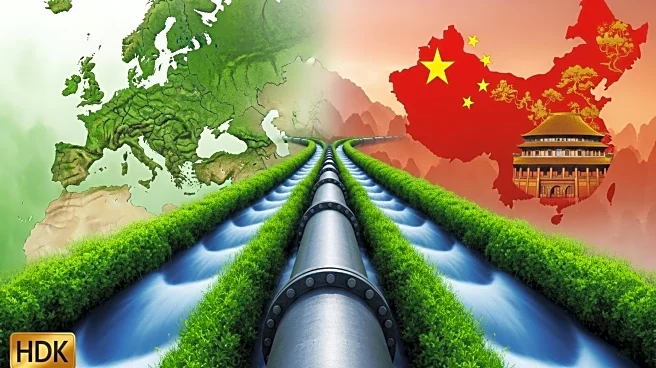What's Happening?
Russia's natural gas exports to Europe have significantly decreased over the past few years. According to the U.S. Energy Information Administration (EIA), European imports of Russian natural gas fell by more than two-thirds from 14.7 billion cubic feet per day in 2020 to 4.4 billion cubic feet per day in 2024. This decline is attributed to various policies and economic factors, despite the absence of direct sanctions on Russian natural gas imports by the EU. However, Russia has managed to redirect its natural gas exports to China, which has increased its purchases. China appears willing to buy more Russian natural gas despite geopolitical tensions related to Russia's actions in Ukraine. Additionally, while Europe has largely stopped buying Russian coal, countries like Turkiye have increased their coal imports from Russia, with China and India also ramping up their purchases.
Why It's Important?
The shift in Russia's natural gas export strategy highlights the geopolitical complexities surrounding energy trade. Europe's reduction in Russian natural gas imports reflects efforts to diversify energy sources and reduce dependency on Russian fossil fuels. However, the increased sales to China indicate that Russia can still find significant markets for its energy exports, potentially undermining international efforts to isolate Russia economically. This situation underscores the importance of transitioning to renewable energy sources to reduce reliance on fossil fuels and mitigate geopolitical risks. The ongoing energy trade dynamics could influence global energy prices and impact the strategic decisions of countries seeking energy security.
What's Next?
Europe may continue to seek alternative energy sources to further reduce its dependency on Russian natural gas. This could involve increased investments in renewable energy infrastructure and technologies. Meanwhile, Russia's growing energy trade with China might strengthen bilateral relations between the two countries, potentially affecting global geopolitical alignments. The situation could also prompt further discussions and actions within the EU regarding energy policy and security. As countries like Turkiye continue to import Russian coal, there may be increased scrutiny and pressure from other nations to align with broader sanctions and energy diversification strategies.
Beyond the Headlines
The ongoing energy trade between Russia and China raises ethical questions about the global response to geopolitical conflicts and human rights issues. China's willingness to purchase Russian natural gas despite the situation in Ukraine may reflect broader strategic interests that prioritize energy security over political considerations. This development could influence international diplomatic relations and negotiations, particularly in forums addressing energy security and climate change. The reliance on fossil fuels continues to pose challenges for global efforts to combat climate change, emphasizing the need for accelerated transitions to sustainable energy solutions.










